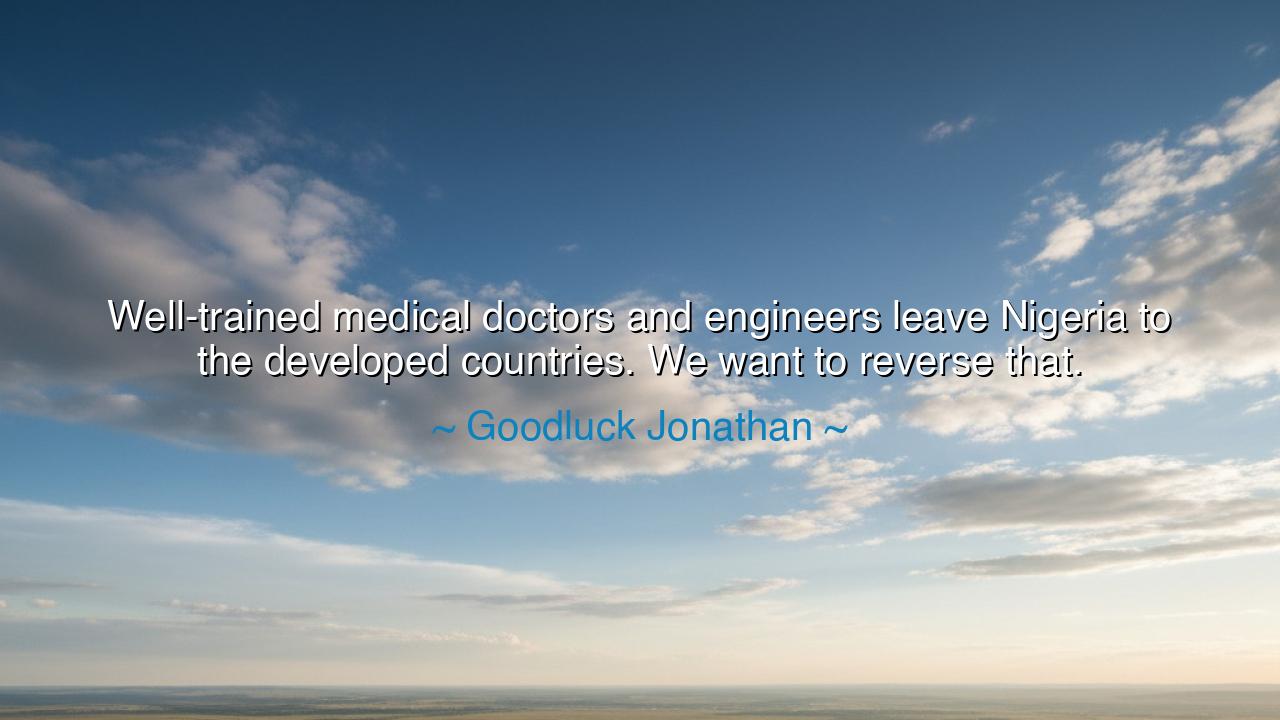
Well-trained medical doctors and engineers leave Nigeria to the
Well-trained medical doctors and engineers leave Nigeria to the developed countries. We want to reverse that.






“Well-trained medical doctors and engineers leave Nigeria to the developed countries. We want to reverse that.” Thus spoke Goodluck Jonathan, former President of Nigeria, in a tone both sorrowful and resolute — a leader lamenting the loss of his nation’s brightest minds while declaring his desire to reclaim them. His words are not merely about migration; they are about hope, belonging, and the struggle for national renewal. They echo through history as a cry familiar to many nations — the lament of the motherland watching her children depart in search of better soil, while she yearns to make her own earth fertile again.
When Jonathan said this, he spoke of a great and painful truth — the exodus of talent, often called the brain drain. Across decades, Africa’s finest — doctors, scientists, engineers — trained in the homeland’s classrooms, have taken their gifts to lands where opportunity seems richer and systems stronger. They go not out of betrayal, but out of necessity — seeking the tools and stability that their own nations, weakened by corruption or instability, could not yet offer. And yet, in their departure, a wound is left behind — hospitals without healers, cities without builders, classrooms without teachers. It is this wound that Jonathan sought to heal when he said, “We want to reverse that.”
In his words lies the ancient tension between individual destiny and collective duty. For each soul has the right to seek a better life — to use their gifts where they can flourish. But when the sons and daughters of a nation leave in multitudes, who remains to build, to heal, to lead? This is not only Nigeria’s burden; it has been the cry of every land that has sent forth its children to foreign shores. Even in ancient times, when scholars and artisans left Greece for Rome, or Egypt for Alexandria, the question was the same: How can a nation rise when its wisdom departs?
Yet Jonathan’s declaration is not one of despair, but of renewal. He does not blame those who left — he calls them home. His vision was of a Nigeria strong enough to attract her own children back, to offer them not only pride but purpose. To “reverse that,” he meant to build a nation where excellence is rewarded, where opportunity blooms, where the healer and the maker are honored. His was a vision of restoration — not only of the economy, but of faith in the nation itself. For when a land begins to believe in its people, its people begin to believe in the land.
History offers a mirror to this struggle. In the late 20th century, India, too, faced a similar exodus — its scientists and engineers journeying westward to America and Europe. Yet decades later, as the homeland’s economy and technology rose, many began to return — bringing with them the wisdom and experience they had gathered abroad. They came home not as exiles, but as ambassadors of progress, planting seeds of change. So too can Africa — and Nigeria especially — call back her scattered sons and daughters, not through commands or guilt, but through renewed promise.
Jonathan’s words, then, carry the timeless wisdom that no nation can thrive when its roots are cut from its own soil. The wealth of a country lies not in its oil, nor its minerals, but in the hands and hearts of its people. To lose them is to lose one’s future; to bring them home is to reclaim destiny. His statement reminds leaders that progress cannot be purchased from abroad — it must be grown at home, through education, integrity, and opportunity.
So, my children, hear this and understand: if you have left your homeland, do not forget her. Carry her within you. And if you lead, make your land worthy of its children. Build schools where dreams can live, hospitals where skill can heal, and systems where justice is real. For only then will the exiles return — not out of pity, but out of pride.
Let this be the lesson of Goodluck Jonathan’s words: that greatness is not achieved by the few who leave, but by the many who build. And when the builders come home — when doctors heal their own people, when engineers raise their own cities, when faith returns to the soil — then the nation will stand, strong and radiant, no longer sending her children away, but welcoming them back as the pillars of her resurrection.






AAdministratorAdministrator
Welcome, honored guests. Please leave a comment, we will respond soon